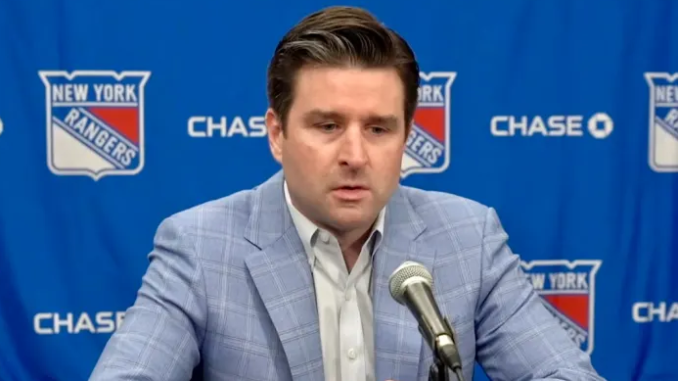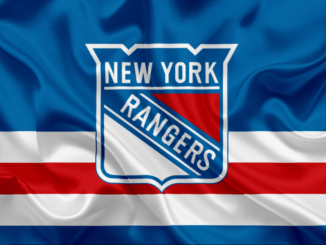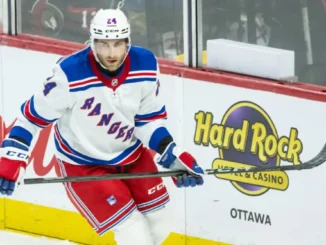
Igor Shesterkin’s contract extension is approaching, and the New York Rangers must be cautious not to overpay. A recent article by Mollie Walker in the New York Post, published on September 20th, highlights the goalie’s contract situation. So far, Shesterkin has played down the issue, focusing instead on the upcoming season. It’s well-known that the Rangers’ success largely hinges on two factors: goaltending and special teams. Now, the team faces a delicate situation. Shesterkin is widely regarded as one of the best goalies in the NHL, and he aims for his next contract to reflect that elite status. While the Rangers can’t afford to lose a player of his caliber, can they meet his potentially steep salary demands?
Where Things Stand Now
Negotiations between the team and player appear to be in the early stages, at best. After an impressive regular season, Shesterkin posted a 36-17-2 record, with a 2.58 goals-against average and a .913 save percentage. He elevated his performance in the playoffs, finishing 10-6 with a .927 save percentage. Given this, Shesterkin’s leverage is likely at its peak. It’s no shock that initial reports suggest his camp is seeking up to $12 million annually—a figure that would make him the highest-paid goaltender by far.

Does Shesterkin deserve such a large contract? Absolutely. For the last 20 years, the Rangers’ success has relied heavily on goaltending, beginning with Henrik Lundqvist. Rangers fans have been lucky to transition from a Hall of Fame goalie to a rising Russian star who seems destined for a similar legacy. An elite goalie can mask a team’s weaknesses and has often saved the Rangers from challenging situations.
Will Igor Shesterkin be the highest paid goalie in the NHL? 💰
(via @FriedgeHNIC, 32 Thoughts) pic.twitter.com/dTVESplWg7
— B/R Open Ice (@BR_OpenIce) September 6, 2024
Shesterkin’s resume strengthens his case: he’s a Vezina Trophy winner and has finished in the top 10 for the award twice more, including a top-5 finish. Looking at top NHL goalie contracts (via Spotrac), the highest-paid are:
– Andrei Vasilevskiy: 8 years, $9.5M AAV
– Sergei Bobrovsky: 7 years, $10M AAV
– Ilya Sorokin: 8 years, $8.25M AAV
– Juuse Saros: 8 years, $7.74M AAV
– Connor Hellebuyck: 7 years, $8.5M AAV
These are the league’s elite, yet Shesterkin’s deal remains to be determined. Beyond dollar amounts, it’s crucial to consider the contract’s cap impact. Vasilevskiy’s deal takes up 10% of the Lightning’s cap, while Bobrovsky’s exceeds 11% for the Panthers. Sorokin and Hellebuyck are both around 9-9.4%, and Saros has the most cap-friendly deal at 8.4% for the next three years.
A precedent has been set for elite goaltender contracts, but Shesterkin’s camp aims to push beyond it, hoping to set a new standard.
How Much is Too Much?
Igor Shesterkin’s contract extension poses a complex challenge for the Rangers. In the final year of his current deal, the Russian star will account for a modest 6.4% of the team’s salary cap for the 2024-25 season, making it the sixth-highest cap hit on the roster. If Shesterkin’s reported asking price of $12 million per year is accurate, that would surpass Artemi Panarin’s $11.6 million, which represents 13.2% of the team’s cap. While high salaries for goalies aren’t uncommon in the NHL, a deal as large as Shesterkin’s potential new contract would be unprecedented.
In a discussion of the highest-paid goalies, Carey Price is often excluded. Despite being one of the best goalies in history, his career has been cut short by injuries, likely preventing him from playing for the Montreal Canadiens again. However, Price, along with Andrei Vasilevskiy and Sergei Bobrovsky, is one of only three goalies whose cap hit is at least 10% of their team’s salary cap—two of whom are Stanley Cup winners and future Hall of Famers.
Has Shesterkin earned a similar deal? Absolutely. Since joining the Rangers, he has been a highlight-reel player, earning admiration and frustration alike with his remarkable goaltending. Yet, that doesn’t mean the Rangers can afford to offer him a blank check. General manager Chris Drury has a reputation for being a sharp negotiator, as seen in the contracts of players like Barclay Goodrow and, to some extent, Jacob Trouba.
Proceeding with Caution
If Igor Shesterkin’s contract extension turns into a massive deal, it would merely preserve the status quo for the Rangers. This follows the same approach the team used during the Lundqvist era. Having a top-tier goalie provides a security blanket that few teams enjoy, but the Rangers have already shown that relying solely on goaltending can’t define their identity.
The Rangers can’t keep depending on their goaltending alone. They need to address their weaknesses. What are those weaknesses? Over the last few years, the Rangers have been average in 5v5 play. Shesterkin’s heroics can only do so much when their forwards struggle to score.
Take the 2024 NHL playoffs as an example: the Rangers had the best goalie, yet it only led to a six-game exit in the Eastern Conference Final. Meanwhile, the Edmonton Oilers made the Stanley Cup Final with Stuart Skinner, who, while good, isn’t elite and accounts for just 3% of his team’s cap. Looking at recent Stanley Cup winners, except for contributions from stars like Bobrovsky and Vasilevskiy, the remaining goalies — Adin Hill, Darcy Kuemper, and Jordan Binnington — were good but not top-tier. Even when Vasilevskiy signed his big contract, he had already won a Stanley Cup on a $3.5M salary.
As things stand, do the Rangers need Igor Shesterkin? Absolutely. But that’s part of the issue. Ideally, their success wouldn’t rely so heavily on their goaltender. Yet the Rangers haven’t been in an ideal situation for decades. Sooner or later, they’ll have to reshape their roster to be more than just power-play specialists. Counting on a hot goalie isn’t a long-term strategy for success.
The concern is that if the Rangers can’t negotiate Shesterkin’s contract down from a high figure, giving in to his demands could be a mistake the franchise regrets for years. The Rangers have been an incomplete team for a while, and even legendary goalies like Jacques Plante, Georges Vezina, or Ken Dryden couldn’t solve that. Shesterkin’s extension can’t exceed 10% of the team’s salary cap — anything higher could hurt their future, especially with a 30-year Stanley Cup drought hanging over them.



Be the first to comment